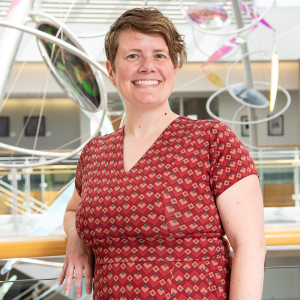Plant Structure & Function

Jan. 7, 2026
Jagdeep Singh Sidhu
Sidhu grew up on a small farm in Punjab, India, an experience that continues to shape his approach to agricultural research. Motivated by practical challenges faced by farmers, his work integrates fundamental plant biology with applied breeding to improve crop resilience. His training spans crop breeding and genetics, root biology, and in silico modelling. Educational Background Ph.D. Pennsylvania State University…

Aug. 26, 2025
Erik Amézquita
I am an Assistant Professor for Data Science at the Division of Plant Science & Technology with an adjunct appointment in Math. I am mainly interested in understanding and modeling plant morphology using topological data analysis (TDA). I am also interested in morphometrics, developmental plant biology, basic image processing, directional statistics, and data science for social justice. I go by he/él pronouns. I got my Ph.D. from the Department of Computational Mathematics, Science and Engineering (CMSE) at Michigan State University. I worked under the guidance of Dan Chitwood and Liz Munch. Before that, I got my math degree from the Universidad…

June 24, 2025
Erin Sparks
Sparks holds a joint appointment with the University of Missouri and the Donald Danforth Plant Science Center. She is passionate about interdisciplinary approaches to solve complex challenges. Her background training includes a B.S. in Biomedical Engineering, a Ph.D. in Cell and Developmental Biology and postdoctoral work in Plant Molecular Biology. Educational background Ph.D., Vanderbilt University…

July 31, 2024
Joseph H. Lynch
Dr. Lynch grew up in rural Washington State and received his BS in Biology from Gonzaga University. He then earned his PhD from Washington State University in the Molecular Plant Sciences program, with his graduate research in the lab of Dr. Sanja Roje focusing on the metabolism of flavin cofactors. After completion of his degree, he took a postdoctoral position in Dr. Natalia Dudareva’s lab at Purdue University studying the production and release of phenylpropanoid/benzenoid volatiles in plants. During his postdoc, he helped elucidate a cytosolic pathway for synthesis of the amino acid phenylalanine in plants that operates in parallel…

Sep. 25, 2023
Marc Libault
Educational background Ph.D., Molecular and Cellular Plant Physiology, Paris 11 University (Sud-Orsay, France), IJPB, INRA of Versailles, 2004 M.S., Molecular and Cellular Plant Physiology, Paris 6 Pierre et Marie Curie University (Paris, France), 2000 B.A., Cellular Biology and Physiology, Molecular and Cellular Genetic section, Paris 7 Denis Diderot University (Paris, France), 1999…

July 5, 2023
Jaime Barros-Rios
The Barros laboratory is dedicated to conducting both fundamental research and applied biotechnology to tackle global challenges such as food security, climate change and the sustainable production of energy and commodity chemicals. Our work in the lab revolves around three main objectives: Enhancing stress tolerance, forage quality and CO2 sequestration in food and feed crops. Developing bioenergy crops to achieve sustainable production of fuels, chemicals and bioproducts. Generating trees with improved properties for the production of paper pulp. The primary focus of our research lies in understanding the metabolic processes related to plant cell wall composition, specifically focusing on the…

May 1, 2023
Norman Best
Plant architecture directly influences plant productivity. The Best Lab is focused on manipulating the current maize architecture to improve productivity and resist yield losses incurred by a changing environment. Plant hormones regulate all aspects of plant architecture. Our research is primarily targeting three hormone pathways: gibberellins, brassinosteroids and auxin. We have identified that manipulating endogenous levels of these plant growth regulators through both genetic and biochemical approaches results in drastic effects on plant shape and form. While many of these changes in architecture are beneficial to improve plant performance, there are consequences that can cause deleterious effects. We have used…

Feb. 8, 2023
Richard Ferrieri
Rich Ferrieri earned his PhD degree in Nuclear & Radiochemistry from Texas A&M University in 1979, and then became a postdoctoral fellow under Alfred Wolf at Brookhaven National Laboratory (BNL). He was later hired onto the scientific staff at BNL working on the medical applications of Positron Emission Tomography (PET) for animal and human research. In 2002, he shifted his interest away from medical research, and into plant biology leveraging many of the same imaging and radiochemistry tools to study basic plant functions. He is credited with developing the first radiolabeled PET plant hormone (11C-jasmonic acid) to study its transport…

Feb. 7, 2023
Richard Dixon
Educational background DPhil, Botany, University of Oxford, UK MA, Biochemistry, University of Oxford, UK…

Feb. 21, 2022
Sam Lord
Educational background Ph.D. , University of Missouri, Natural Resources – Emphasis in Soil M.S., University of Missouri, Natural Resources – Emphasis in Soil B.S. 2016, University of Missouri, Soil, Environmental, and Atmospheric Sciences – Emphasis in Soil Courses taught Soil 2100 Lecture: Introduction to Soil Science Soil 4308/7308: Soil Conservation Soil 4312/7312: Environmental Soil Microbiology…